Clinical studies are the cornerstone of medical innovation, and today, we are witnessing a revolution as artificial intelligence (AI) transforms how these studies are conducted. By integrating AI into the design and execution of clinical studies, we can optimize patient selection, streamline processes, and enhance predictive outcome modeling. In this article, we explore how AI-driven clinical studies are reshaping the future of medicine, the benefits they offer, the challenges they face, and the best practices for successful implementation.
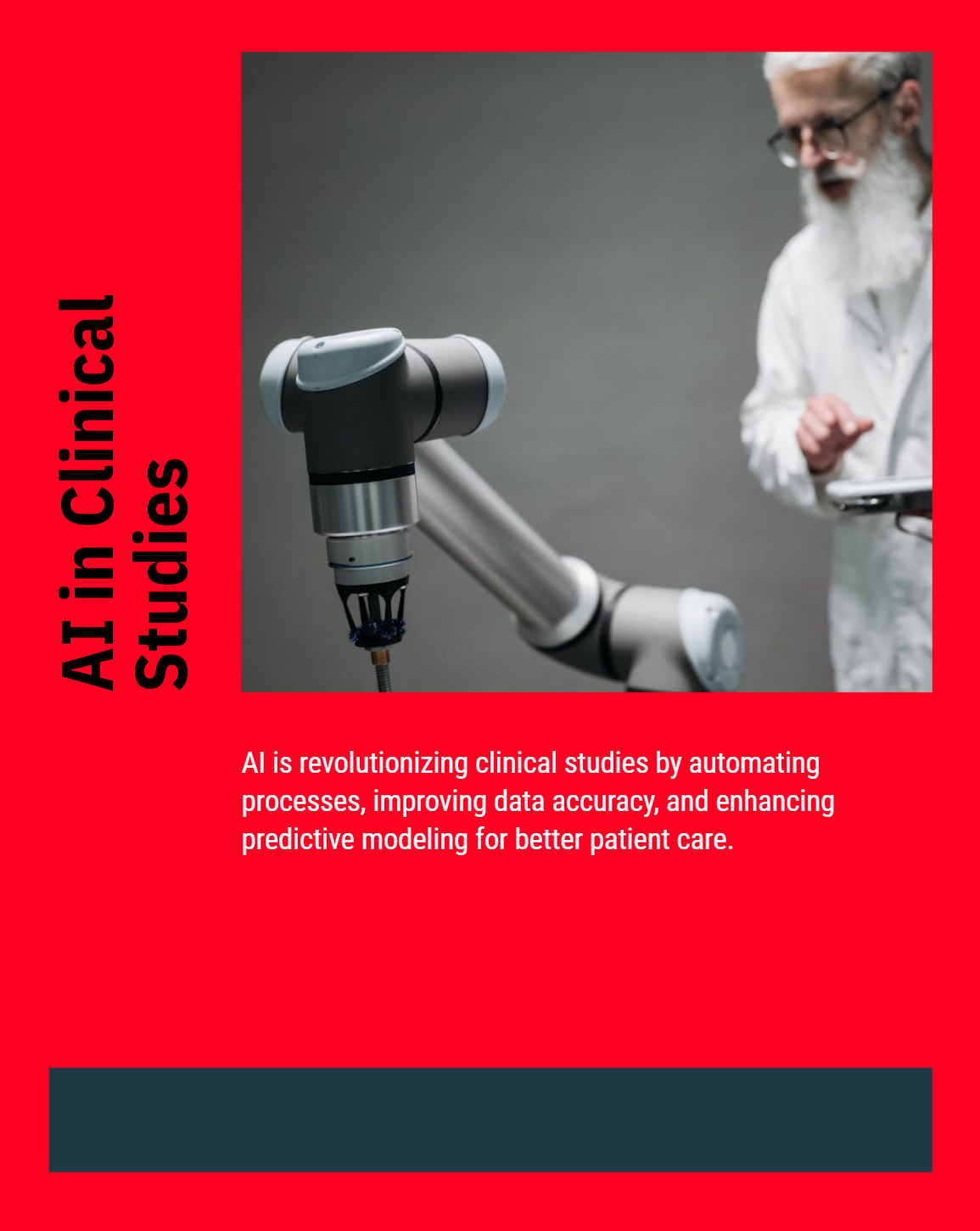
In recent years, AI has made impressive strides in various fields, and its impact on clinical studies is no exception. Traditionally, clinical studies involved manual data collection, slow patient recruitment, and labor-intensive analysis. With AI, we now see the potential to automate many of these processes, making studies faster, more accurate, and ultimately more cost-effective.
The use of AI in clinical studies means that data is not only collected more efficiently but also analyzed using sophisticated algorithms that can identify trends, predict outcomes, and help researchers make more informed decisions. Our goal is to understand these advancements and show how they can lead to better healthcare outcomes for everyone.
From Traditional Methods to AI-Driven Approaches
Historically, clinical studies relied heavily on manual processes that were prone to human error. Researchers had to sift through mountains of data, often missing key insights hidden in vast datasets. Today, AI helps by automating these tasks, reducing the likelihood of mistakes and speeding up the research process. AI tools can quickly process large datasets, identify patterns, and even predict potential issues before they arise.
Timeline of Technological Advancements
The journey from traditional to AI-driven clinical studies has been marked by key technological milestones:
These advancements have not only streamlined research but also paved the way for more personalized and effective treatments.
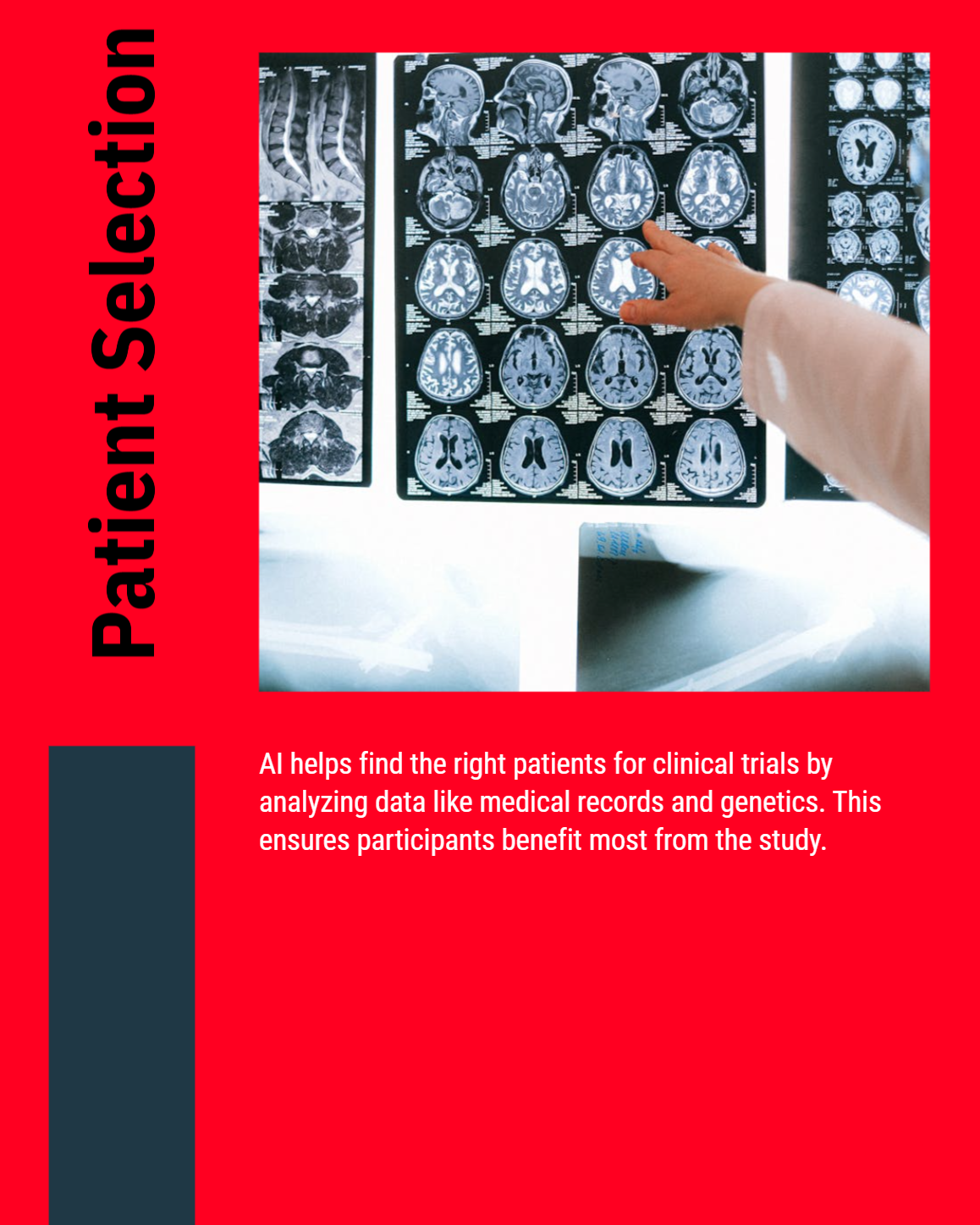
Selecting the right patients is crucial to the success of any clinical study. AI transforms patient selection by using data-driven approaches to match patients with studies based on numerous factors, including genetic makeup, medical history, and lifestyle.
Data-Driven Patient Recruitment
AI algorithms sift through large datasets to identify potential study participants. This data may include electronic health records, demographic information, and even social determinants of health. By analyzing this data, AI can pinpoint individuals who are most likely to benefit from a new treatment or drug.
For example, if a study is focused on a new medication for diabetes, AI can analyze patient records to find those who have a specific genetic marker or a history that suggests they might respond well to the treatment. This targeted approach not only speeds up recruitment but also enhances the quality of the study data.
Benefits of Personalized Patient Matching
Personalized matching goes beyond simple data filtering. It involves understanding the nuances of each patient’s condition and how they might react to a particular treatment. AI systems can assess millions of data points to create a detailed profile for each patient, leading to:
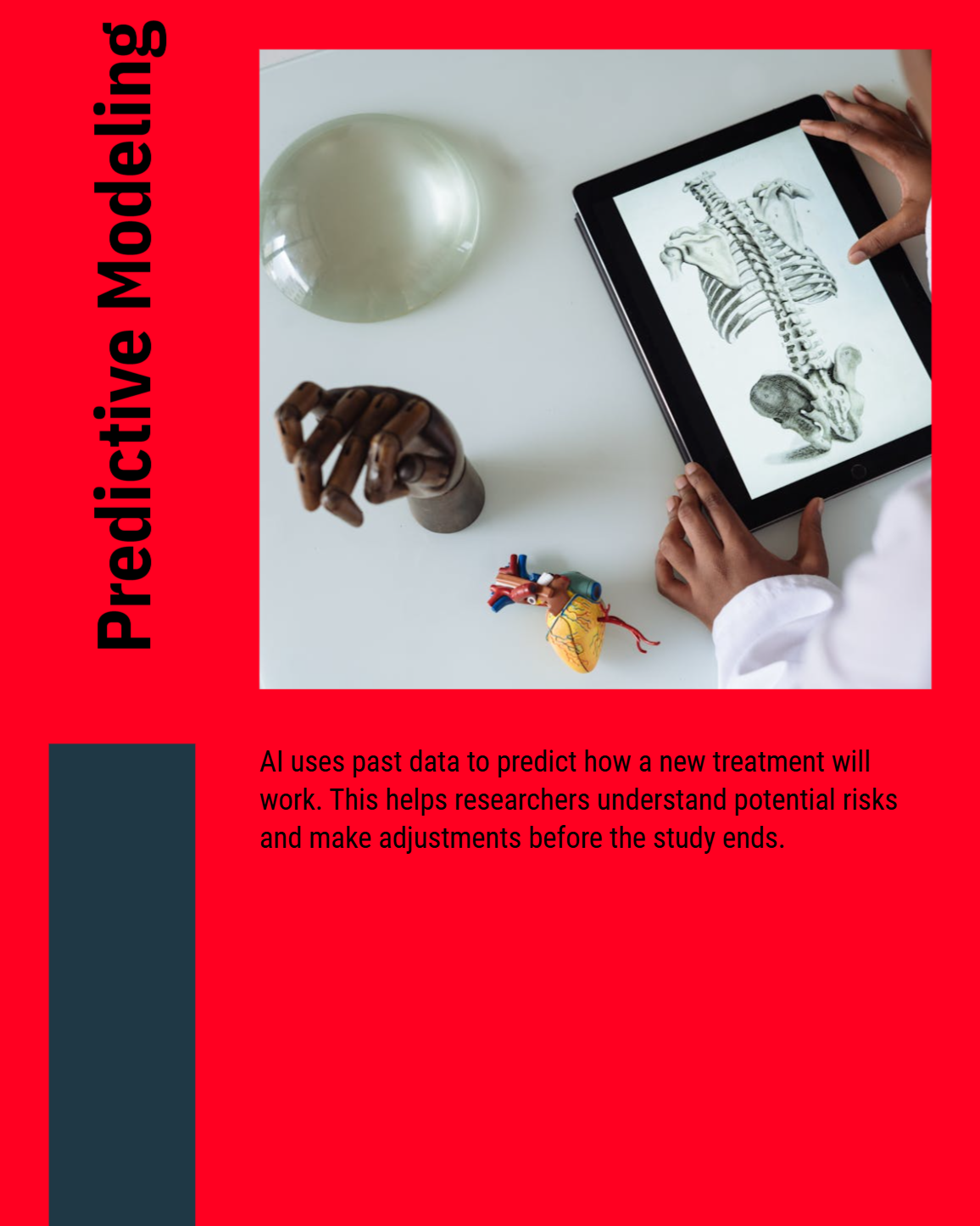
Predictive outcome modeling is another area where AI is making a significant impact. This process involves using historical and real-time data to forecast the results of a clinical study before it concludes.
Leveraging Machine Learning for Accurate Predictions
Machine learning algorithms are designed to learn from data. In clinical studies, these algorithms analyze previous studies and ongoing study data to predict outcomes such as treatment efficacy, side effects, and patient response variability. By running simulations and analyzing patterns, researchers can adjust protocols in real time, potentially saving lives and reducing study costs.
Risk Assessment and Early Detection
Another benefit of predictive modeling is its ability to assess risks early on. By identifying potential problems before they become critical, researchers can modify study parameters to mitigate risks. This proactive approach not only protects patients but also ensures the reliability and validity of the study results.
Several cutting-edge technologies are at the heart of AI-driven clinical studies. These technologies work together to enhance the overall research process, making it more efficient and effective.
Machine Learning and Deep Learning
Machine learning, a subset of AI, is the engine behind many clinical study optimizations. It enables systems to learn from data and improve over time. Deep learning, which uses neural networks, takes this a step further by processing vast amounts of unstructured data, such as images and natural language, with high accuracy.
Natural Language Processing and Data Analytics
Natural Language Processing (NLP) allows AI systems to understand and interpret human language. This is particularly useful in clinical studies, where patient records, doctor notes, and research publications contain valuable insights hidden in free-text data. Data analytics then aggregates and interprets this information to support decision-making.
Real-World Data Integration
One of the most promising aspects of AI in clinical studies is the integration of real-world data (RWD). RWD comes from diverse sources such as wearable devices, patient registries, and EHRs. By combining RWD with traditional clinical study data, AI provides a more comprehensive view of a treatment’s effectiveness in real-life settings.
Benefits of AI in Clinical Studies
The integration of AI in clinical studies offers a multitude of benefits that can transform the landscape of medical research.
Improved Efficiency and Cost Savings
AI reduces the time and resources needed to conduct clinical studies by automating many processes. This efficiency leads to significant cost savings, allowing researchers to allocate more resources toward innovation and patient care. Faster patient recruitment, streamlined data processing, and predictive modeling all contribute to a more efficient workflow.
Enhanced Data Quality and Accuracy
Data is the backbone of any clinical study, and AI ensures that the data collected is accurate and of high quality. Automated data collection minimizes human error, and advanced analytics help in cleaning and validating the data. As a result, researchers can trust the integrity of their findings and make better-informed decisions.
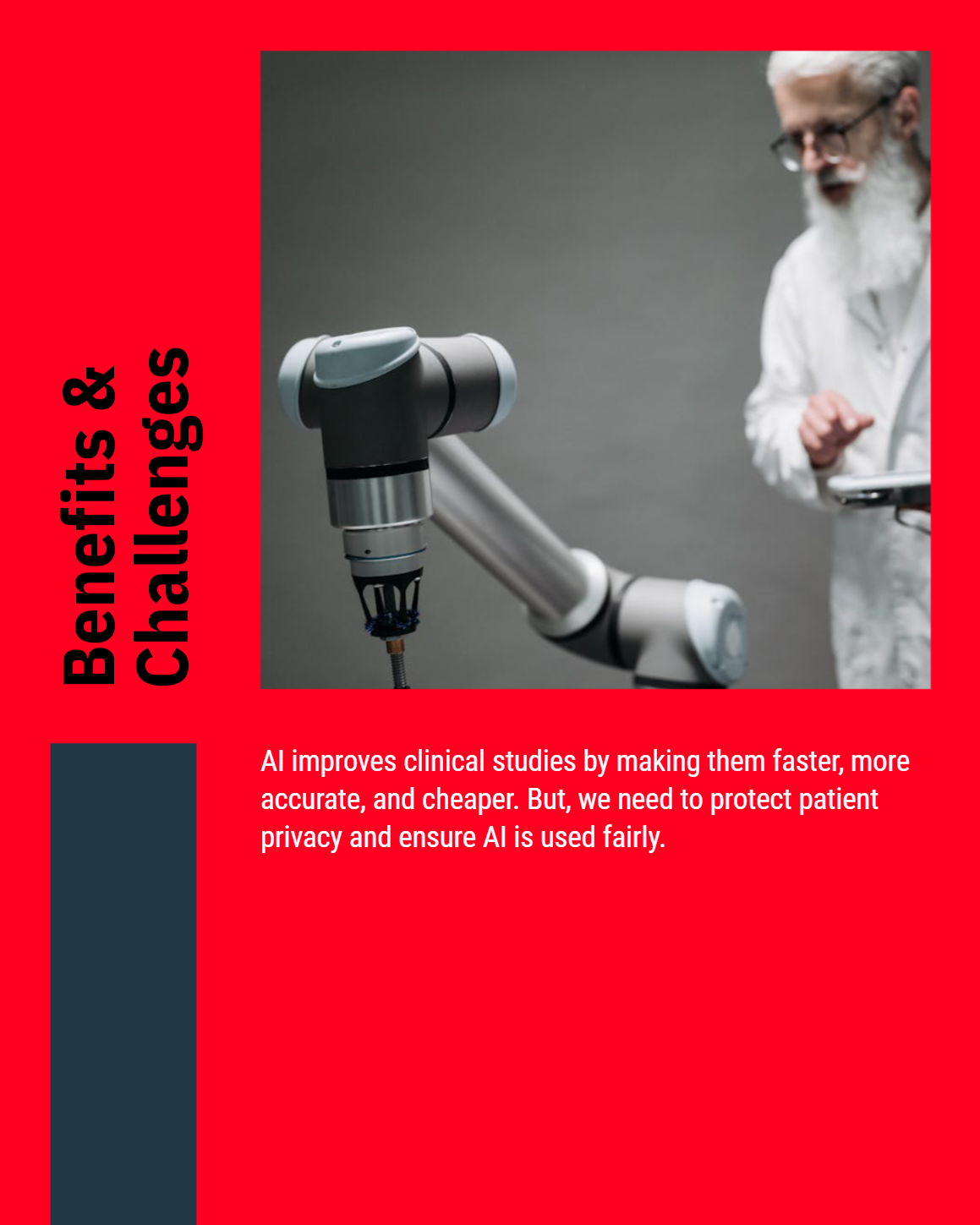
While AI offers significant advantages, its integration into clinical studies is not without challenges. It is essential to address these challenges to fully realize the benefits of AI in this field.
Data Privacy and Security
One of the most pressing concerns is the privacy and security of patient data. AI systems require vast amounts of data to function effectively, and ensuring that this data is handled responsibly is paramount. Robust encryption methods, strict access controls, and compliance with data protection regulations are vital components in safeguarding sensitive information.
Regulatory and Compliance Issues
Clinical studies are subject to strict regulations, and the use of AI introduces additional layers of complexity. Regulatory bodies must ensure that AI tools meet rigorous standards for safety and efficacy. Researchers and companies must work closely with regulators to ensure that AI-driven methodologies adhere to established guidelines.
Bias and Transparency
AI systems are only as good as the data they are trained on. If the data is biased, the predictions and recommendations made by AI could also be biased. It is crucial to ensure transparency in AI algorithms and continuously monitor them for fairness. Addressing these biases early on is essential to maintain trust in the clinical study process.
As technology evolves, we expect AI to play an even more prominent role in clinical studies. Here are some trends to watch for in the near future.
Integration of Genomics and AI
The fusion of genomics and AI is set to revolutionize personalized medicine. By analyzing genetic information alongside clinical data, AI can identify specific biomarkers that predict treatment success or adverse reactions. This integration will lead to highly tailored therapies that address the unique needs of individual patients.
Virtual studies and Remote Monitoring
The COVID-19 pandemic accelerated the adoption of virtual clinical studies and remote patient monitoring. AI makes it possible to conduct studies without requiring participants to visit research centers, thereby reducing logistical challenges and expanding the reach of studies. Remote monitoring devices, combined with AI analytics, provide real-time insights into patient health, enhancing the overall study process.
Across the globe, several institutions have successfully integrated AI into their clinical studies, demonstrating its potential to drive better outcomes.
Real-World Examples of AI Implementation
One notable example involves a large-scale oncology study where AI was used to match patients with the most suitable treatment options. By analyzing genetic data and historical treatment outcomes, the AI system was able to reduce patient recruitment time by nearly 40% and increase the accuracy of patient matching.
Another case study in cardiology showed that predictive outcome modeling significantly improved the early detection of adverse events. This allowed researchers to adjust treatment protocols promptly, resulting in improved patient safety and study efficiency.
Quantifiable Outcomes and Benefits
The benefits of AI are often quantifiable. Consider the following table that highlights key differences between traditional and AI-driven clinical studies:
| ASPECT | TRADITIONAL STUDIES | AI-DRIVEN STUDIES |
|---|---|---|
| Patient Recruitment Time | 6-12 months | 2-4 months |
| Data Processing Accuracy | Moderate (subject to human error) | High (automated data validation) |
| Cost Efficiency | Higher overall costs | Lower costs due to automation |
| Outcome Prediction | Limited predictive power | Advanced predictive analytics |
| Adaptability to Changes | Slow and rigid | Agile and responsive |
Table: A comparison of traditional versus AI-driven clinical studies.
These examples and data points clearly illustrate how AI is reshaping the landscape of clinical research by making studies more efficient, cost-effective, and patient-focused.
For organizations considering the integration of AI into clinical studies, following best practices is essential to ensure success.
Strategies for Effective Integration
Collaborative Efforts and Stakeholder Engagement
Successful implementation of AI in clinical studies requires collaboration among various stakeholders, including pharmaceutical companies, research institutions, regulatory bodies, and patient advocacy groups. Open communication channels and shared goals can help bridge the gap between technology and clinical practice. By involving all parties in the process, we can build a robust framework that not only meets regulatory standards but also addresses the real needs of patients.
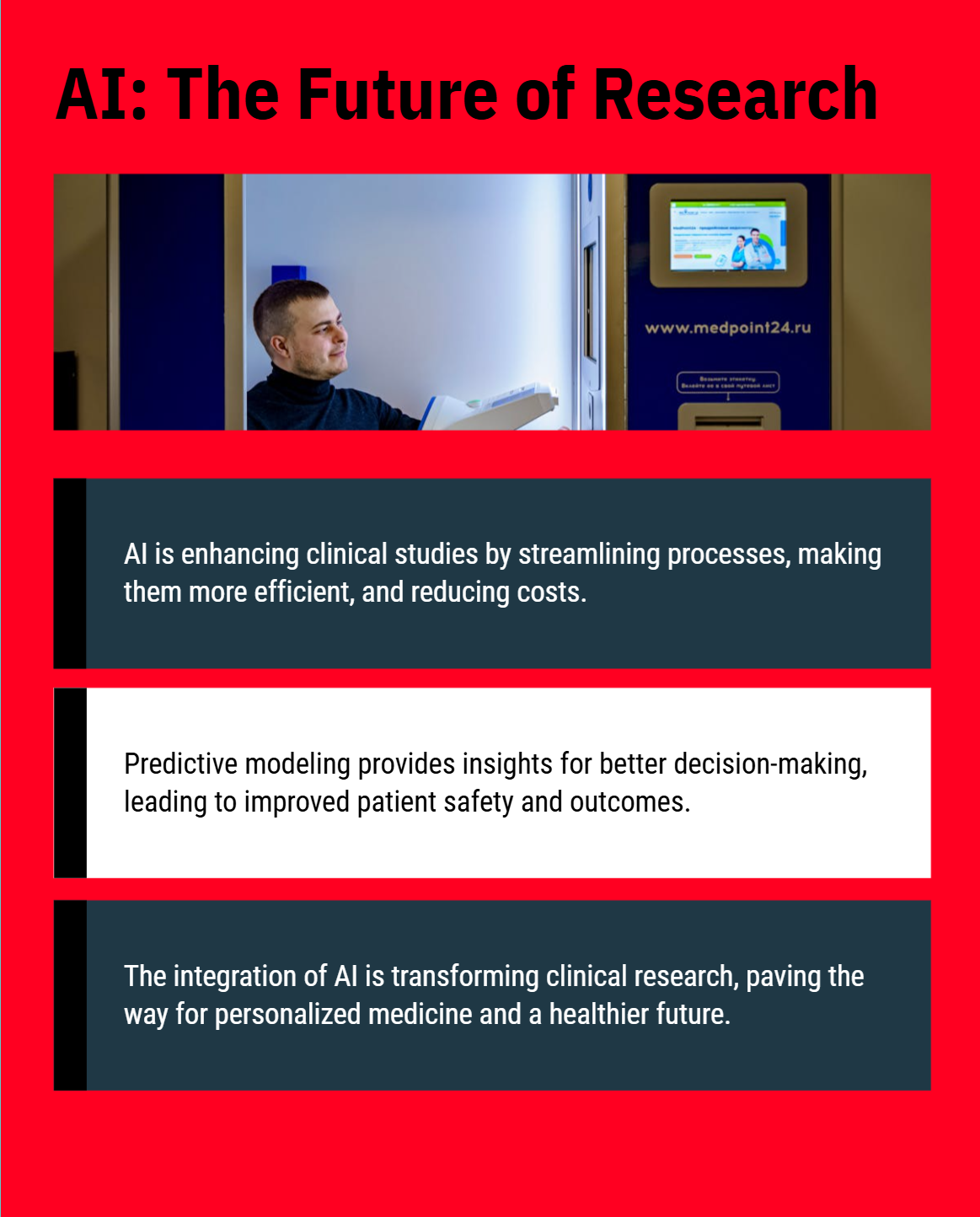
AI-driven clinical studies are revolutionizing the field of medical research by enhancing patient selection and predictive outcome modeling. The integration of advanced machine learning, deep learning, and data analytics into clinical research is leading to faster, more efficient, and more cost-effective studies. While challenges such as data privacy, regulatory hurdles, and potential biases remain, the benefits of AI far outweigh these obstacles. As we continue to innovate and refine these technologies, the future of clinical studies looks promising, paving the way for personalized medicine and improved patient outcomes.
The journey from traditional methods to AI-enhanced clinical research is ongoing, and the insights gained today will shape the future of healthcare. We are excited to see how these innovations will lead to more effective treatments and a healthier world for everyone.
AI-driven clinical studies integrate artificial intelligence technologies to automate processes like patient recruitment, data analysis, and outcome prediction. This leads to faster, more precise, and cost-effective research.
AI analyzes vast amounts of data from sources like electronic health records and genetic information to identify the most suitable patients for a study. This personalized matching increases the chances of successful outcomes.
Predictive outcome modeling uses historical and real-time data to forecast treatment results and detect potential risks early. This helps researchers adjust study protocols proactively, improving overall patient safety.
Some challenges include ensuring data privacy and security, meeting regulatory standards, addressing potential algorithmic biases, and maintaining transparency in AI-driven decisions.
AI will drive advancements in personalized medicine, streamline patient recruitment, enable remote monitoring through virtual studies, and ultimately lead to more effective and efficient treatments.
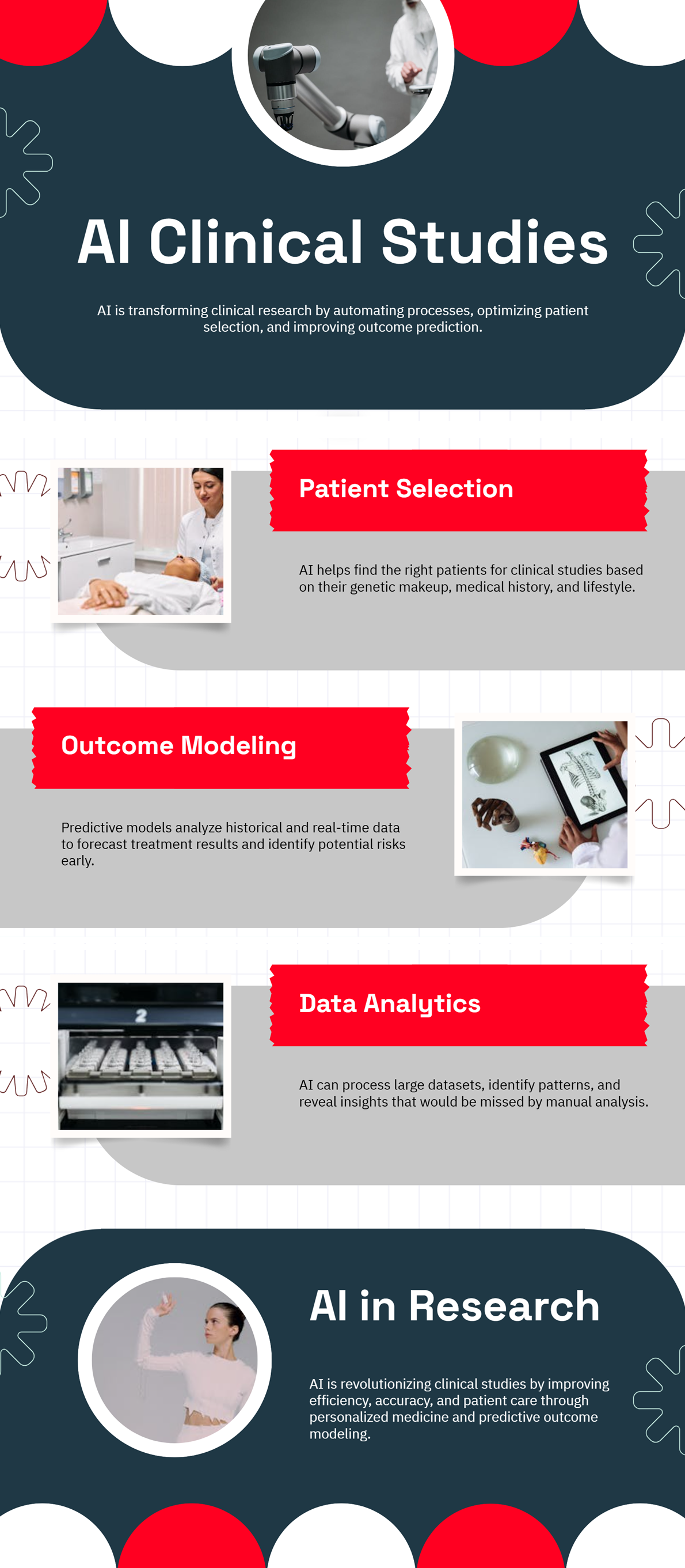 04.02.2025
04.02.2025